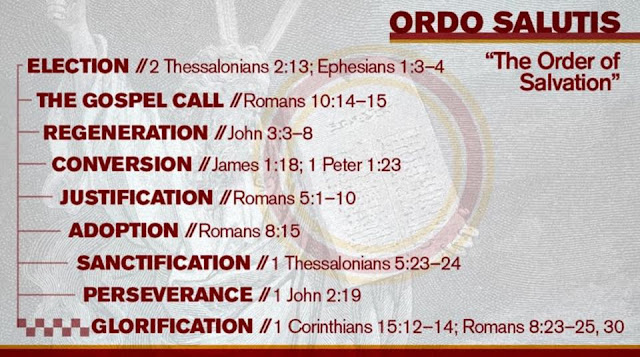Is there an "order of salvation"?
Some Christians teach what is called an "order of salvation" (Latin: "ordo salutis") which, as seen in the sample pictured here, sets forth salvation as a "process"--an ordered sequence of "steps." This post offers a critique of that conception of salvation from Karl Barth and Al Kimel.
Those who believe that the Bible teaches that salvation can be reduced to an ordo salutis typically cite as evidence various passages of Scripture (as in the diagram), including this one:
For those God foreknew he also predestined to be conformed to the image of his Son, that he might be the firstborn among many brothers and sisters. And those he predestined, he also called; those he called, he also justified; those he justified, he also glorified. (Romans 8:29-30)
Is Paul here outlining sequential steps in a linear "process" of salvation? Barth and Kimel [1] say no. Read on.
Karl Barth's view
In a recent Karl Barth Discussion Group post, theologian and professor Jerome Kuiken outlines Karl Barth's strong objection to the idea of an ordo salutis. Kuiken notes that in stating his objection, Barth used arguments from "1) Scripture, 2) theological reason, and 3) Christian experience:"
"1) Scripture shows no interest in schematizing salvation; the sheer variety of Protestant ordines signals exegetical mishandling that abstracts terms from their biblical usage and combines them arbitrarily (CD IV/3.2:505-507).
"2) The unity of the act of salvation shatters when we serialize it into objective atonement followed by subjective vocation, then subjective justification, then subjective sanctification. Just as in the Chalcedonian Christ, deity and humanity exist simultaneously and undividedly, so too with salvation (CD IV/2:502-505; IV/3:505-508).
"3) Focusing on an ordo salutis turns our attention away from Christ and onto our own flawed reason and experience, which leads to hubris as we try to rationally master salvation and also leads to insecurity as we try to ground assurance of salvation in ourselves instead of Christ's objective work (CD IV/2:502-503, 582-84; IV/3.2:505-508)."
Al Kimel's view
In a recent post on his Eclectic Orthodoxy blog, Alvin (Al) Kimel, like Barth, questions the very idea of an ordo salutis. In making his point, he first cites another passage from Paul often used to argue in favor of an ordo:
For in Christ Jesus the whole fullness of deity dwells bodily, and you have been filled in him, who is the head of all rule and authority. In him also you were circumcised with a circumcision made without hands, by putting off the body of the flesh, by the circumcision of Christ, having been buried with him in baptism, in which you were also raised with him through faith in the powerful working of God, who raised him from the dead. (Col. 2:9-12)
Kimel comments:
"We compose ordines salutis to conceptualize how conversion, regeneration, justification, sanctification, glorification cohere in the divine plan of salvation. There’s nothing strange about any of this. We exist as temporal creatures in a cosmos of change and becoming. How can we not speak of a 'process of salvation? ....But read again the above citation [from Colossians] from the Apostle Paul. Smack dab in the middle of the process of salvation is our death; and whatever else death is, it is the end of process. In baptism we are buried with Christ Jesus. The old Adam has been crucified. The font is our tomb. And from that tomb emerges a new person who has been reborn in the Holy Spirit and united in the most intimate way with the risen Lord. 'I have been crucified with Christ; it is no longer I who live, but Christ who lives in me; and the life I now live in the flesh I live by faith in the Son of God, who loved me and gave himself for me' (Gal 2:20). The baptized have been given an eschatological mode of existence: they now live the life of the coming Kingdom. This existence is not yet ours as possession; it will become so only at the general resurrection. Now we live the in-between in the receptivity and openness, trust and expectation Christians call faith."
Conclusion
What Barth and Kimel help us understand is that the idea of a linear, logically-constructed, ordo salutis does not do justice to the reality of salvation in Christ. That reality cannot be reduced to a step-by-step, sequential process. Indeed, salvation is not a process. It is not a transaction. Instead, salvation is fundamentally personal and, as such, relational. Jesus, himself, is our salvation, and in our union with him, by the Spirit, we experience all that Jesus (who is salvation) is for us and with us, as one of us. Salvation thus cannot be reduced to separate elements.
For a wholistic, relational view of salvation, see my earlier post on The Surprising God blog at http://thesurprisinggodblog.gci.org/2012/12/a-wholistic-view-of-salvation.html.
_______________
[1] Aiden (Alvin) Kimel is an Eastern Orthodox theologian and retired priest who blogs at Eclectic Orthodoxy (https://afkimel.wordpress.com/).
